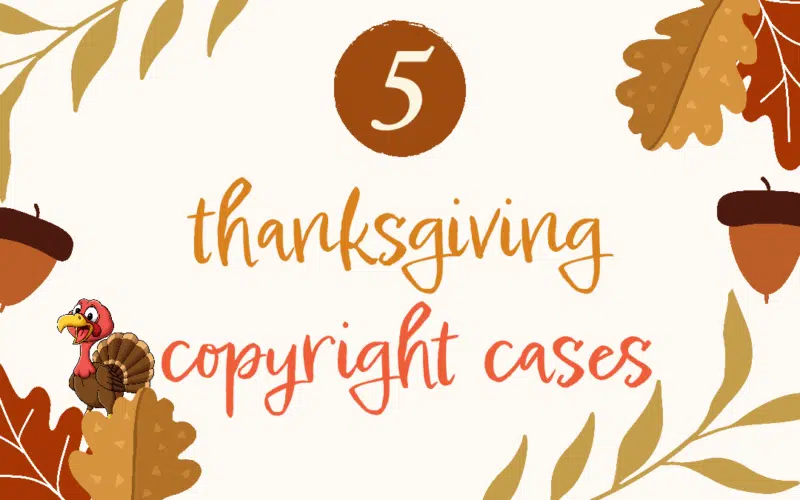If you like your turkey with a side of copyright infringement, you’ve come to the right place.
Ahh, Thanksgiving. There’s nothing quite like eating dinner at 4 p.m. and falling asleep on your brother’s couch by 4:30. But before you enter your tryptophan-induced coma, feast your eyes on Copyright Lately‘s platter of 5 Thanksgiving-themed copyright cases, all stuffed with a generous helping of legal fowl play.
1. I’ve Got It—Now Who Do I Sue?
First up is a 2010 copyright infringement lawsuit by Texas-based Greenberg Smoked Turkeys over turkey preparation directions (read the complaint here). To be clear, we’re not talking about some magnum opus explaining how to prepare Turducken on steroids. It’s literally three paragraphs of basic instructions on how to heat up turkey that’s already been cooked:

Greenberg was bent out of shape when it learned that one of its competitors, Goode-Cook, had copied portions of Greenberg’s instructions for use with its own pre-cooked turkeys:

In Goode’s defense, precooked turkey is a lazy person’s sport, so it helps to have an instruction writer who channels that vibe. As far as copyright goes, while a mere listing of ingredients isn’t protected, the Copyright Office tells us that “substantial literary expression in the form of explanation or directions” accompanying a recipe may be copyrightable. But let’s face it, there are only so many responsible ways to tell folks how to heat a turkey unless you’re looking to serve a desiccated corpse that only Cousin Eddie will enjoy.

There may have been just enough verbatim copying here to support an infringement claim, but we’ll never know, as Greenberg Smoked Turkeys v. Goode-Cook settled shortly after the case was filed. Goode agreed to remove the offending directions from its website, and all was right with the world again.
4. A Cornucopia of Copying
Here’s some more Thanksgiving thievery, this time over greeting cards. In 2002, a Minnesota district court granted a preliminary injunction in favor of Taylor Corporation against its competitor, Four Seasons Greetings, to prevent further infringement of Taylor’s copyrights in six greeting cards, including this one depicting a Thanksgiving cart:

Hat’s off to Taylor for convincing the Eighth Circuit to affirm the preliminary injunction, but I just don’t see it. Perhaps the result can be chalked up to the court’s rejection of Four Seasons’ argument that the scenes a faire doctrine limited the number of ways that pumpkins and grapes could be depicted, as well as the court’s failure to filter out unprotectable elements. But even putting these limiting doctrines aside, the expression doesn’t strike me as substantially similar in any event.
3. Hatfields and Decoys

Number 3 on the list is a copyright case involving fake turkey. Not the stuff your vegan friend brings with her to Thanksgiving dinner, but hunting decoys.
Back in the late 70s, an insurance agent named Charles Rolfe asked Wesley Streeter, a taxidermist, to design a lightweight turkey decoy mold that could be reproduced and sold commercially. As is often the case in these situations, the parties didn’t agree on the terms of their business venture, and when the relationship fell apart, each claimed superior rights to the decoy. When Rolfe later developed his own set of similar turkey molds, Streeter sued for copyright infringement.
The court found that Rolfe’s turkey decoy didn’t infringe Streeter’s copyright. Recognizing that the parties had a limited range of options when attempting to replicate a creature found in nature, the court astutely noted that “both decoys must resemble a turkey, or they would be useless.” There were visible differences in the neck, tail and body fullness between Turkey Decoy No. 1 and Turkey Decoy No. 2, such that neither appeared to be an exact copy of the other. So while his turkey may have been thick, Streeter’s copyright was thin, and he lost his case.

2. No, You Get Out

In 2007, writer Tia Griffin sued filmmaker Jordan Peele, along with Blumhouse Productions and NBCUniversal, claiming that defendants’ acclaimed psychological horror film “Get Out”—a fictional movie about sinister activities at a wealthy couple’s country house—copied her non-fiction self-help book about dating and religion.
As these sorts of lawsuits go, this one was particularly ridiculous. It appears to have been driven almost entirely by the fact that a single paragraph in Griffin’s book referred to an incident in which she and her ex-boyfriend hit a deer while driving to his family’s house for Thanksgiving dinner. If you’ve seen “Get Out,” you may recall that it contains a scene in which the lead characters, Chris and Rose, hit a deer while driving to Rose’s childhood home.
Aside from the fact that the two works aren’t similar in the slightest, the deer-hitting scene in “Get Out” doesn’t even happen on Thanksgiving. You may then be wondering why I’m even including Griffin v. Peele in my list of Thanksgiving-themed copyright cases, to which I’ll say: you try finding five legitimate Thanksgiving-related copyright cases and let me know how it goes.
Thankfully, the court threw out Griffin’s claim on a motion to dismiss (read here), causing the lawsuit to meet the same fate as the deer.
1. You Deserve a Break Today
Copying reheating instructions and turkey decoys is one thing, but if you’re going to copy a turkey wishbone, be prepared to take out your checkbook. Sears learned that the hard way in 2008 after it was ordered to pay nearly $2 million in damages for copying the Lucky Break Wishbone Company’s plastic wishbones.

After coming up with this simple yet ingenious product, the fledgling company thought it had landed its own lucky break when Sears’ advertising agency expressed interest in buying more than a million of Lucky Break’s plastic wishbones to give to shoppers over Thanksgiving weekend.
Lucky Break dutifully provided Sears with some sample wishbones made from its molds, which the now-bankrupt retail chain promptly sent to a Chinese manufacturer to copy.
Defending Lucky Break’s copyright infringement lawsuit, Sears argued that because the wishbone was a naturally occurring item, it wasn’t protectable. The court disagreed. The key to Lucky Break’s victory was evidence that the company’s founder, Ken Ahroni, had made several non-utilitarian aesthetic contributions to the wishbone to make it look sleeker and more attractive than its natural counterpart. Supporting this evidence was expert testimony from an ornithologist who opined that the Lucky Break Wishbone included seven features that would not be found in nature, but rather were “of distinctly human creation or design.”
So, while Lucky Break had the same sort of limited “thin copyright” that applied to the turkey decoys in Streeter v. Rolfe, a Seattle jury found that the parties’ wishbones were virtually identical and awarded Lucky Break $1.7 million in damages—a verdict later affirmed by the Ninth Circuit.
And there you have it! The Thankgivingest copyright cases ever. To recap what we’ve learned:
- Don’t add flour to your oven bag, unless you don’t want your turkey to explode.
- Wheelbarrows aren’t just good for carting pumpkins, but also grapes.
- Turkey decoys may not be protectable if they look like real turkeys.
- Plastic wishbones may be protectable if they don’t look like real wishbones.
- Watch out for deer—you never know when they’ll appear!
Happy Thanksgiving everyone!







